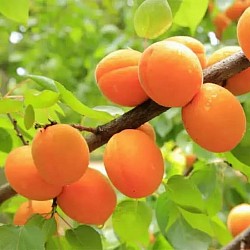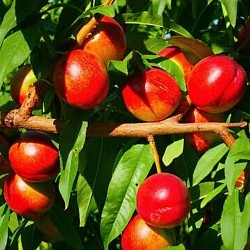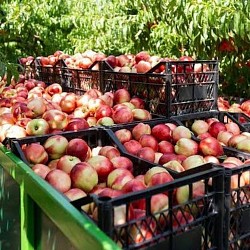Exporting Apricots and Nectarines from South Africa
What Makes South African Apricots Stand Out
South African apricots stand out in the global market primarily due to their exceptional flavor profile, vibrant color, and consistent quality. Benefiting from the unique climatic conditions in key growing regions, these apricots develop a distinctive sweetness and juiciness, coupled with an appealing golden-orange hue. The industry's focus on careful handling, efficient cold chain logistics, and adherence to international quality standards ensures that these delicate fruits reach consumers fresh, maintaining their premium taste and texture. This dedication to delivering a high-quality product contributes significantly to their market appeal.
How We Pack and Label
Apricots are packed in the industry-standard 4.75 kg telescopic export carton, engineered for optimal airflow, stacking strength, and cold chain stability throughout export transit. This carton format ensures consistent presentation and durability, making it the preferred choice across premium stone fruit programs into UK and EU markets. Fruit is arranged for size consistency and presentation, supporting Class 1 grading and seamless integration into high-care retail and wholesale workflows.
Key Apricot Cultivar Groups Exported by Africa Harvest Exporters
Traditional Yellow-Orange Apricots:
Traditional yellow-orange apricots constitute a foundational and enduring segment within South Africa's apricot industry, historically prominent for both processing and fresh consumption, and continuing to hold significant value for export. These classic cultivars are celebrated for their quintessential apricot characteristics: a consistent, inviting yellow to vibrant orange skin, which may sometimes feature a subtle natural blush, encasing exquisitely sweet, juicy flesh. They emit a distinctive, rich apricot aroma that is immediately recognizable and highly appealing. While the global market has seen a growing demand for newer, red-blushed varieties due to their striking visual appeal, these traditional apricots retain their importance for fresh exports, particularly in discerning markets that specifically value their authentic appearance, balanced flavor profile, and reliable texture. Their inherent firmness and robust qualities ensure they can withstand the rigors of long-distance shipping, arriving in pristine condition to meet consumer expectations for quality and taste.
What Makes South African Nectarines Stand Out
South African nectarines stand out in the global market due to their exceptional flavor, appealing appearance, and crucial counter-seasonal supply. Cultivated in regions blessed with abundant sunshine and optimal growing conditions, these nectarines develop a perfect balance of sweetness and acidity, coupled with firm, juicy flesh and vibrant skin color. The industry boasts a diverse range of modern, highly sought-after varieties that consistently meet evolving consumer preferences. Furthermore, South Africa's strategic position allows it to supply premium nectarines to the Northern Hemisphere during its winter months, effectively filling a critical market window. Rigorous quality control, advanced packing technologies, and an efficient cold chain ensure that these delicate fruits maintain their superior condition and taste during long-haul transit, solidifying their reputation as a top-tier international supplier.
How We Pack and Label
Africa Harvest Exporters delivers premium South African nectarines in SMS-compliant 2.5 kg open-top cartons, precision-packed for high-visibility retail programs across the UK and EU. Each tray showcases Class 1 fruit in tightly graded size bands, flow-wrapped or netted for optimal presentation. Packaging conforms to PPECB cold chain protocols and EU retail requirements, with certified labelling that includes traceability, varietal identity, and country of origin. Modular pallet configurations and ISPM 15-compliant wooden bases ensure seamless export logistics, while our cultivar-specific spec sheets provide buyers with instant access to ripening profiles, shelf-life data, and botanical provenance.
Key Nectarine Cultivar Groups Exported by Africa Harvest Exporters
Yellow-Flesh Nectarines:
Yellow-flesh nectarines constitute the backbone of South Africa's nectarine export industry, dominating shipments to international markets due to their classic appeal and robust characteristics. These varieties are highly prized for their vibrant golden-yellow flesh, which delivers a superb balance of sweetness and refreshing tanginess, often accompanied by a firm, juicy texture. Cultivars spanning the early, mid, and late seasons ensure a continuous supply, allowing South African growers to consistently meet demand in key export destinations. Their attractive, often full-red skin coloration, combined with excellent internal quality and good post-harvest handling capabilities, ensures that these nectarines arrive in pristine condition, reinforcing their position as a consumer favorite and a significant driver of South Africa's stone fruit export success.
White-Flesh Nectarines:
White-flesh nectarines are an increasingly significant and rapidly growing segment within South Africa's stone fruit export portfolio, catering to a burgeoning global demand for intensely sweet and low-acid fruit. Distinct from their yellow-fleshed counterparts, these varieties are celebrated for their delicate, often translucent white flesh that boasts an inherently higher sugar content and a subtle, melting juiciness, delivering a uniquely sweet and fragrant eating experience. While traditionally a niche, the strategic expansion of white-flesh cultivars, including newer proprietary varieties, allows South African exporters to offer a premium product that stands out in international markets. Their exquisite taste, coupled with an appealing blushed skin, makes them a highly sought-after delicacy, ensuring their growing importance in diversifying and enhancing South Africa's comprehensive nectarine export strategy.







